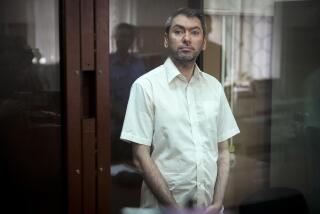No Conditions on Release, Sakharov Says : Reports He’ll Be Free to Speak Out on His Return to Moscow
- Share via
MOSCOW — Dissident Andrei D. Sakharov told telephone callers Sunday that he will be free to speak his mind when he returns to Moscow after seven years of internal exile in the closed city of Gorky.
Sakharov told correspondents that there were no conditions placed on his release or the pardon for his wife, Yelena Bonner, who was also exiled to Gorky, an industrial city 250 miles east of Moscow.
The Nobel Peace Prize winner said that he and Bonner will return to Moscow by train, arriving at 7 a.m. local time Tuesday.
A large crowd of friends and admirers is expected at the station to greet the most famous champion of human rights in the Soviet Union.
The 65-year-old physicist indicated that he is not in the best of health after his long isolation.
“I don’t feel very well,” Sakharov told the Moscow bureau of CBS News. “My wife’s not very well either--as usual.”
Both of the Sakharovs suffer from heart disease, and they look forward to better medical care in Moscow than was available in Gorky, according to family friends.
In a brief interview with Israel radio, Sakharov asserted that he intends to speak out in the future as he has in the past.
“As much as it depends on me, I intend to always say what I think, because I believe that’s the right thing and the necessary thing,” Sakharov was quoted as saying.
Asked his reaction to the Kremlin decision ending his exile, Sakharov replied: “It’s very complicated, very complex. . . . I simply don’t know what to say. I am tongue-tied.”
In the interview with Israel radio, Sakharov promised he will do “the best I can” to facilitate the emigration of Jews who have been refused permission to leave the Soviet Union. Sakharov himself is not Jewish.
In his telephone talk with CBS, he excused himself from giving an interview.
Asked about his future activities, Sakharov said: “I will have to see. I don’t want to decide anything now about my future.”
In a conversation with an Associated Press reporter, Sakharov said he did not want to meet with a group of correspondents after arriving in Moscow.
Asked if he would speak to correspondents at the station, however, he replied, “We’ll see what happens.” The telephone calls were the first known communication between Sakharov and Western news organizations since he was exiled to Gorky on Jan. 22, 1980.
He and Bonner did not have a telephone in their apartment, but one was installed last week, apparently so Soviet leader Mikhail S. Gorbachev could inform Sakharov personally that his exile was over.
The president of the Soviet Academy of Sciences, Guri Marchuk, also telephoned Sakharov to discuss his future scientific work.
The physicist became a member of the prestigious academy at the age of 32 after he played a key role in the development of the Soviet hydrogen bomb. He retained his membership despite his dissident activities and later exile.
More to Read
Sign up for Essential California
The most important California stories and recommendations in your inbox every morning.
You may occasionally receive promotional content from the Los Angeles Times.










